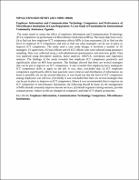| dc.description.abstract | MPAGI EDWARD HENRY (2011-M093-10040)
Employee Information and Communication Technology Competence and Performance of Microfinance Institutions in Loan Repayment: A Case Study of Foundation for International Community Assistance, Uganda.
The study aimed to assess the effect of employee Information and Communication Technology (ICT) competence on performance of Microfinance Institutions (MFIs). The study objectives were; (i) to find out how employee ICT competence affects MFIs in loan repayment, (ii) to find out the level of employee ICT competence and (iii) to find out what strategies can be put in place to improve ICT competence. The study used a case study design; it involved a number of 10 managers, 15 supervisors, 65 loan officers and 10 ICT officers who were selected using purposive sampling. Data was collected using a self-administered questionnaire and interview guide. Data was analysed using descriptive analysis, factor analysis, ANOVA, correlation and regression analysis. The findings of the study revealed that employee ICT competence positively and significantly relate on MFI loan payment. The findings showed that there are several strategies that can be put to improve on ICT competence. It also revealed that employees have inadequate ICT competence skills to apply on the job. It was, thus, concluded that; (i) ICT employee competence significantly affects loan payment since retrieval and distribution of information on loans is possible, (ii) on the second objective, it was found out that the level of ICT competence among employees was still low, (iii) thirdly it was concluded that there are several strategies that can be put in place to improve on ICT competence. Hence it was recommended that to improve on ICT competence in microfinance institutions, the following should be done; (i) the management of MFIs should constantly improve internet services, (ii) should organise training sessions, provide constant power, reduce on the tax charged on computers and other ICT related accessories.
Key Words: Employee Information, Communication Technology Competence, Microfinance Institutions. | en_US |


